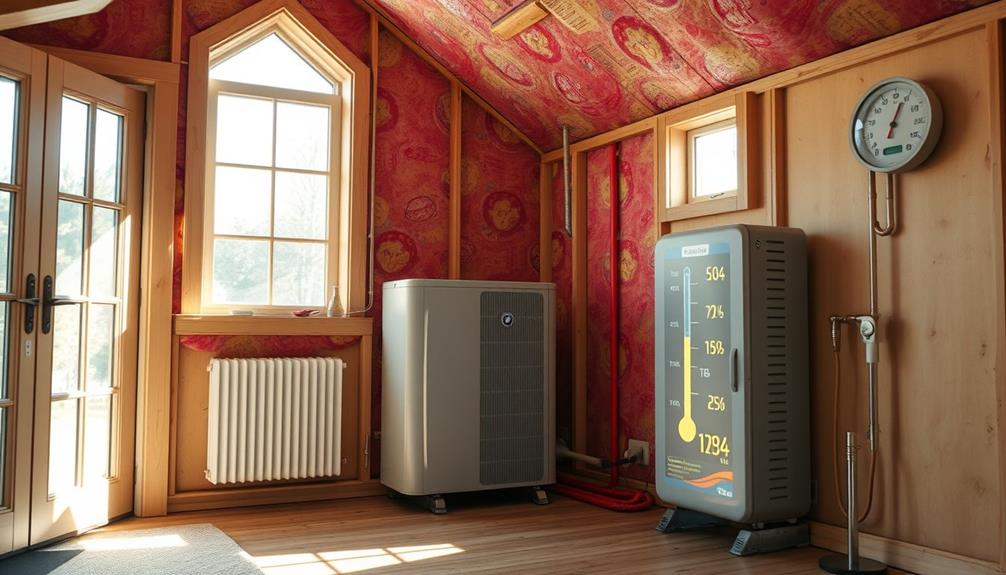To deal with heat pump noise in your home, start by identifying common sources like fan imbalance or loose parts. Guarantee proper installation with adequate clearance and vibration dampers. Regularly maintain your unit by cleaning filters, tightening components, and removing debris. Soundproof the area with insulation or barriers to minimize noise transmission. If noise persists or worsens, it’s wise to consult a professional—there are simple strategies to keep your system quiet that you should explore further.
Key Takeaways
- Regularly inspect and tighten loose components to prevent rattling and reduce noise.
- Ensure proper installation with adequate clearance and vibration dampening pads for soundproofing.
- Schedule annual professional tune-ups to identify and fix mechanical issues causing noise.
- Use sound barriers or acoustic panels around the unit to block noise from escaping into living spaces.
- Operate noise-sensitive functions like sleep mode during quiet hours and avoid frequent cycling or rapid thermostat changes.
Identifying the Common Sources of Heat Pump Noise
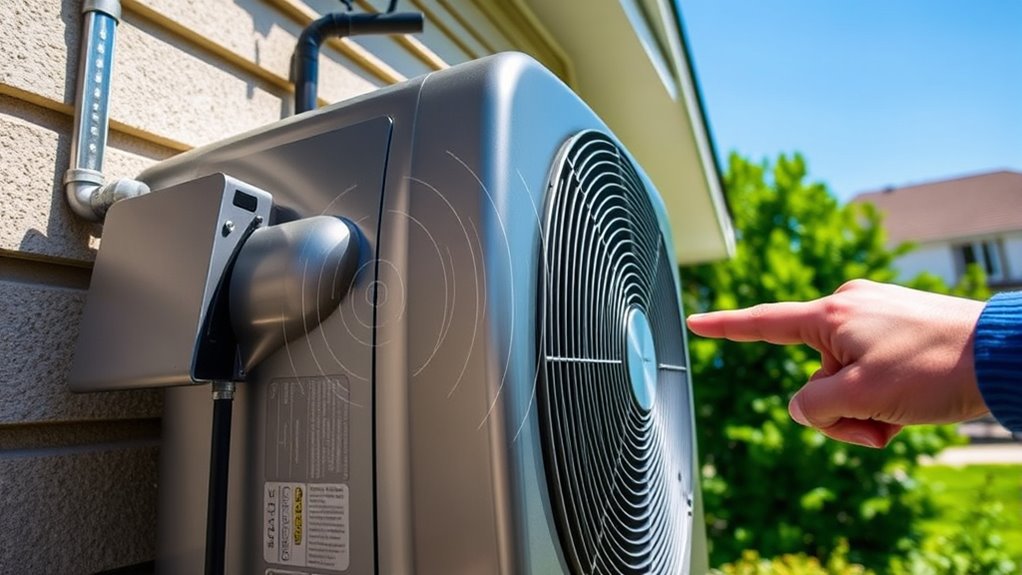
Understanding where heat pump noise originates is essential for diagnosing and reducing disturbances in your home. One common source is the thermostat calibration, which can cause the system to cycle improperly, resulting in unusual sounds. If your thermostat isn’t accurately calibrated, the heat pump might turn on and off more frequently or run at irregular intervals, creating noise disruptions. Another key factor is fan blade alignment. Over time, fan blades can become misaligned or unbalanced, causing rattling or buzzing sounds during operation. Regularly inspecting and maintaining proper fan blade alignment ensures smooth operation and minimizes noise. Additionally, health benefits of maintenance such as cleaning and lubricating components can significantly reduce noise levels and improve system efficiency. By focusing on these areas, you can better identify the root causes of heat pump noise and take effective steps to reduce it.
Understanding How Installation Affects Sound Levels
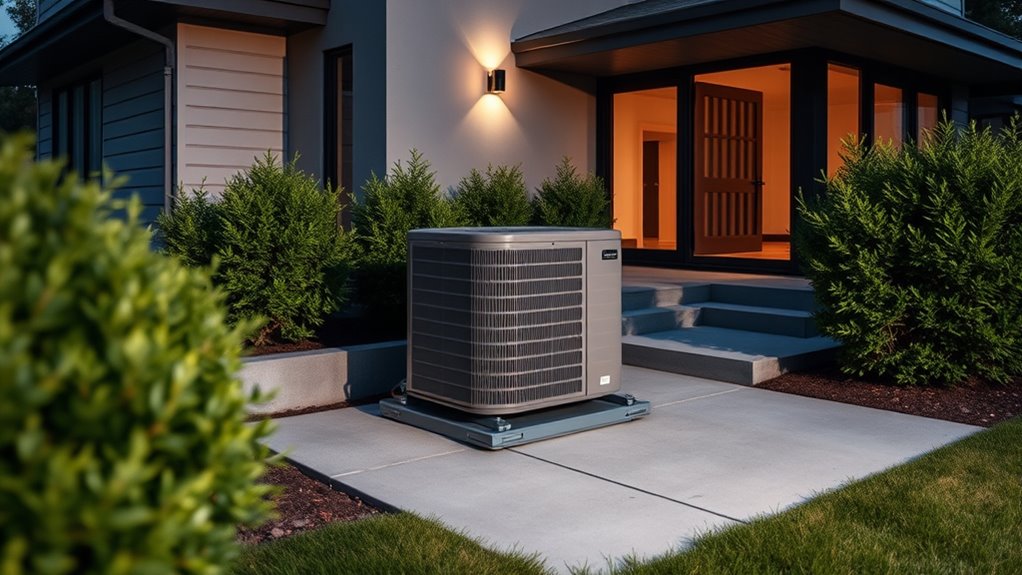
The way your heat pump is installed can considerably influence the noise levels you experience. Proper installation considerations are essential for sound level optimization. For example, placing the unit on a stable, level surface reduces vibrations that can amplify noise. Ensuring the heat pump is positioned away from bedroom windows and living areas minimizes disturbance. Using vibration isolators or pads can dampen sound transmission, and maintaining adequate clearance around the unit prevents sound reflection. Choosing a location with natural barriers like shrubs or fences can also help block noise. Additionally, professional installation ensures components are correctly aligned, reducing mechanical noise. By paying attention to these installation details, you can greatly decrease the noise impact of your heat pump and enjoy a quieter, more comfortable home environment. Proper placement and the right equipment can also enhance overall sound level optimization.
Regular Maintenance Practices to Reduce Noise

Regular maintenance is key to keeping your heat pump operating quietly. By sticking to a consistent maintenance schedule, you can identify and fix issues that contribute to excessive noise. Regularly inspect and tighten loose components, such as fan blades and mountings, to prevent rattling sounds. Clean or replace filters to ensure smooth airflow and reduce strain on the system, which can cause noise. Check for debris around the unit that might cause imbalance or vibrations. Schedule professional tune-ups annually to ensure parts are functioning properly and to catch potential problems early. Proper maintenance not only improves noise reduction but also extends your heat pump’s lifespan, ensuring quieter operation and greater efficiency for years to come. Additionally, understanding the types of noise your system produces can help diagnose specific issues more effectively.
Insulating and Soundproofing Around the Unit

Proper insulation and soundproofing around your heat pump can considerably reduce noise levels in your home. Installing soundproof barriers, such as foam panels or mass-loaded vinyl, helps block noise from escaping or entering your living space. Use insulating materials like fiberglass or mineral wool to wrap around the unit or its enclosure, absorbing vibrations and dampening sound transmission. Guarantee the barriers are tightly sealed to prevent gaps that could allow noise leaks. Positioning soundproof barriers strategically—especially on the sides and top of the unit—maximizes their effectiveness. Regularly inspect and maintain the insulation to keep soundproofing efficient. Incorporating protective styling techniques can further help in reducing the impact of noise and vibrations transmitted through the structure. By combining soundproof barriers with quality insulating materials, you create an effective barrier that minimizes heat pump noise and enhances your home’s comfort.
Checking and Tightening Loose Components
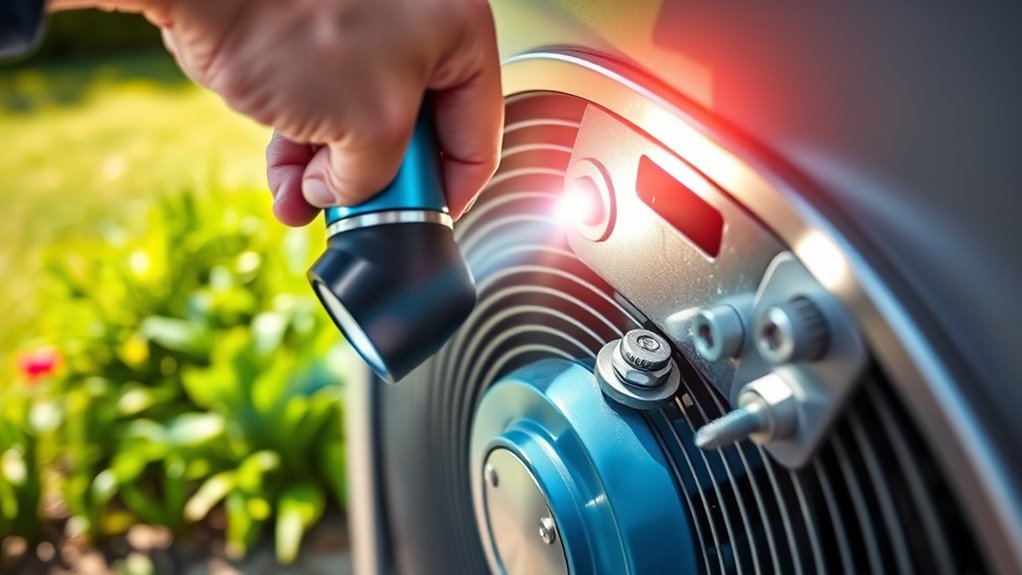
Loose components in your heat pump can cause rattling, vibrations, and increased noise. To fix this, start with a thorough component inspection. First, turn off the unit and locate all accessible parts. Next, check for any loose screws, nuts, or bolts. Then, tighten connections where you notice movement or gaps. Finally, inspect the mounting brackets and fasteners to ensure they’re secure. Use a wrench or screwdriver as needed, but avoid overtightening, which can cause damage. Regular connection tightening helps prevent unwanted noise and extends the unit’s lifespan. Remember, addressing loose components early keeps your heat pump running smoothly and quietly. A simple inspection and tightening process can make a significant difference in noise reduction. Being aware of potential IRA tax implications can also help you plan financially for maintenance or upgrades if needed.
Upgrading to Quieter Heat Pump Models
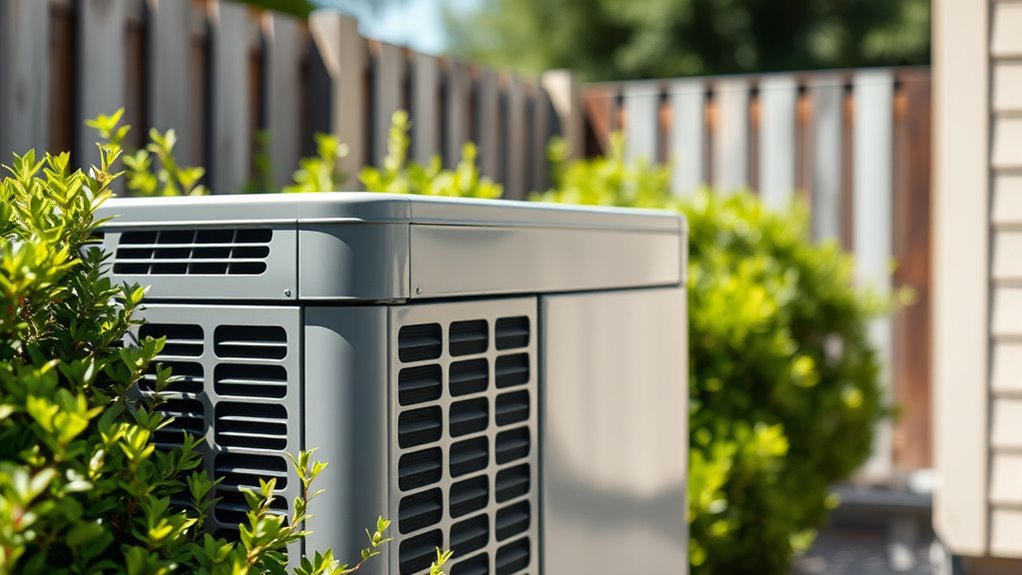
Upgrading to a quieter heat pump model can considerably reduce noise levels in your home. Modern units feature advanced design improvements and smart technology integration, making them more efficient and quieter. Look for energy-efficient upgrades that prioritize sound reduction, such as insulated components and variable-speed compressors. When choosing a new model, consider the following features:
| Feature | Benefit | Example |
|---|---|---|
| Sound Insulation | Reduces operational noise | Insulated compressor panels |
| Variable-Speed Motor | Lowers noise during operation | Precise speed adjustments |
| Smart Technology | Enables remote monitoring & control | App integration for noise alerts |
| Energy Efficiency | Lowers energy bills, reduces noise | High SEER ratings |
| Compact Design | Minimizes installation noise | Slim, space-saving units |
Upgrading to a modern, energy-efficient, and smart-enabled model ensures quieter operation and improved home comfort.
Using Vibration Pads and Anti-Vibration Mounts
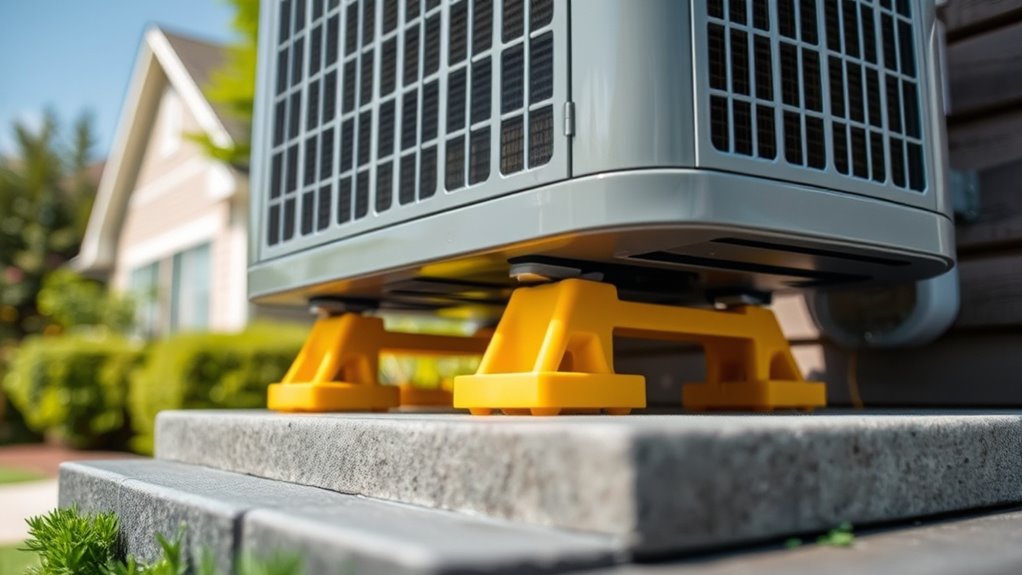
To effectively minimize heat pump vibrations and reduce noise, incorporating vibration pads and anti-vibration mounts is essential. These accessories absorb vibrations at the source, preventing them from transferring to your home structure. Here’s how to use them effectively:
- Place vibration pads directly beneath the heat pump’s base to cushion contact points.
- Install anti-vibration mounts on mounting brackets or pads to isolate vibrations further.
- Ensure the vibration pads are made from durable, shock-absorbing materials like rubber or foam.
- Regularly check and replace worn anti-vibration mounts to maintain peak noise reduction.
- Choosing the right dog breeds for quieter operation can also help in managing overall noise levels in your home.
These simple steps can considerably cut down noise levels, making your heat pump operate more quietly and comfortably. Proper use of vibration pads and anti-vibration mounts provides a practical, cost-effective solution.
Adjusting System Settings for Quieter Operation
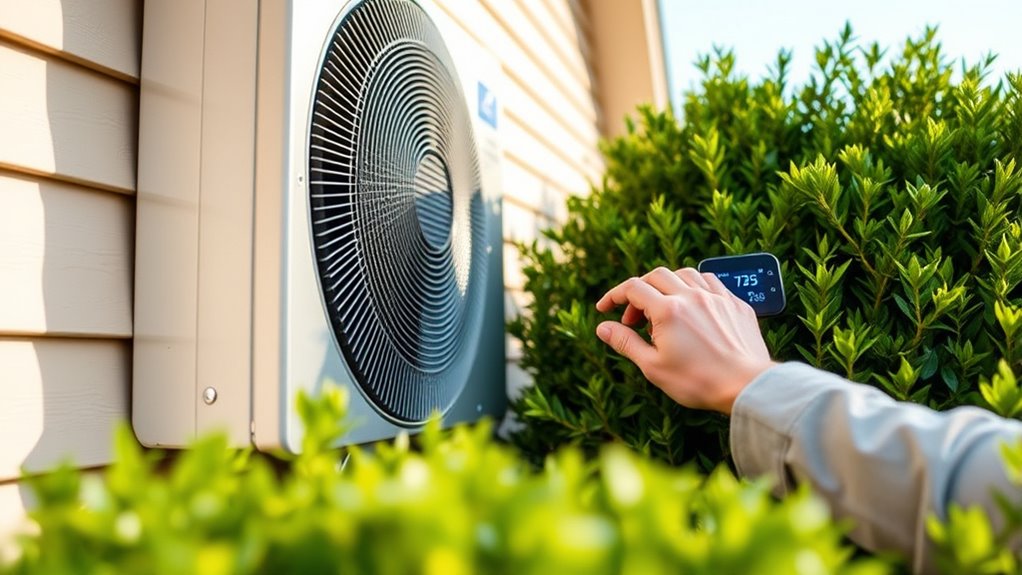
Adjusting your heat pump’s system settings can considerably reduce noise levels during operation. Start by lowering the fan speed, which minimizes sound without sacrificing performance, improving energy efficiency and reducing environmental impact. Enable the quiet mode or sleep settings if available; these modes are designed to operate more silently during off-peak hours. Adjust the thermostat to avoid frequent on/off cycles that create noise and wear on the system. Regularly cleaning and maintaining filters ensures smoother operation, further reducing noise. Additionally, consider setting the compressor to run during less noisy periods if your system allows. These adjustments help optimize your heat pump’s operation, lowering noise while promoting energy efficiency and minimizing environmental impact, making your home more comfortable and eco-friendly. Improving system calibration can also help in reducing unnecessary noise and enhancing overall performance.
When to Seek Professional Assistance
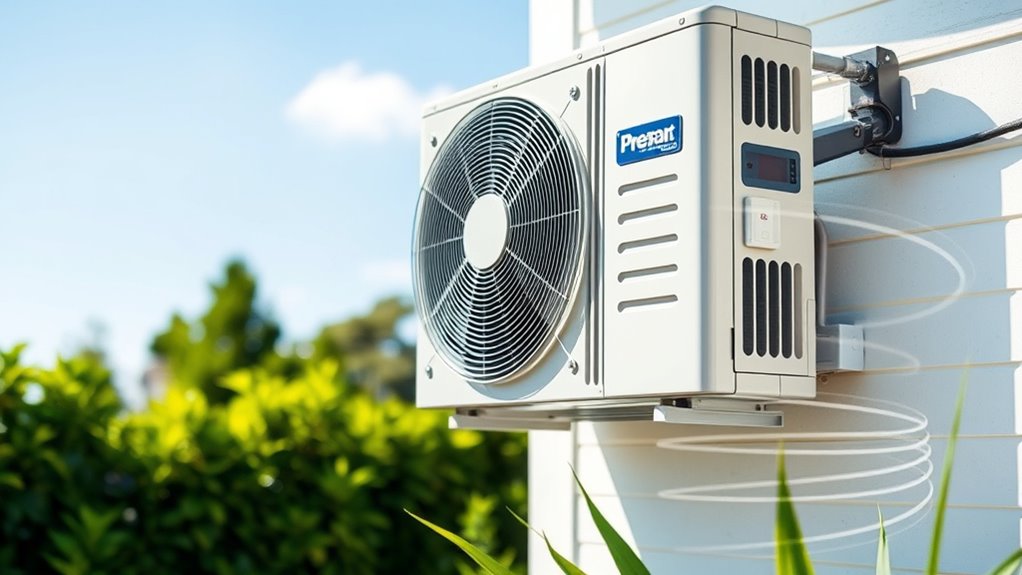
If your heat pump makes persistent unusual noises, it’s time to call a professional. Sudden changes in system performance or unresponsive equipment also signal you should seek help. Addressing these issues promptly can prevent costly repairs and guarantee your system runs smoothly. Recognizing resource availability in your area can also help you find qualified technicians more efficiently.
Persistent Unusual Noises
Unusual or persistent noises coming from your heat pump should never be ignored, as they often indicate a malfunction or underlying issue. If you notice a consistent noise that doesn’t match normal operation, it’s time to seek professional help. Pay attention to:
- Noise frequency: Is the noise high-pitched or low, steady or intermittent? Unusual patterns may signal specific problems.
- Vibration sources: Feel for excessive vibrations; they often point to loose components or motor issues.
- Type of noise: Rattling, banging, or screeching sounds typically indicate mechanical faults.
- Duration: If the noise persists despite basic troubleshooting, it’s a sign to consult an expert.
Addressing these clues early can prevent further damage and ensure your heat pump runs quietly and efficiently.
Sudden System Changes
When your heat pump suddenly behaves differently, it’s a clear sign that something isn’t right. Unexpected changes, such as new or louder noises, reduced heating or cooling, or frequent cycling, can indicate issues affecting system efficiency. These sudden shifts often lead to increased noise pollution, disturbing your home’s peace. Ignoring these signs can cause minor problems to escalate, resulting in costly repairs and further efficiency loss. If you notice your heat pump’s performance changing abruptly, it’s time to seek professional help. A technician can diagnose underlying issues early, ensuring your system runs smoothly and quietly. Addressing sudden system changes promptly helps maintain comfort, reduce noise pollution, and preserve your heat pump’s ideal efficiency. Additionally, system maintenance plays a crucial role in preventing unexpected malfunctions and extending the lifespan of your unit.
Unresponsive Equipment
Sometimes, your heat pump may stop responding to thermostat commands or fail to start altogether, signaling that professional help is needed. When this happens, it’s essential to address potential issues before noise complaints escalate. Here’s what to do:
- Check power connections and circuit breakers to ensure the unit is receiving power.
- Review your thermostat settings to confirm they are correct.
- Inspect for obvious signs of damage or loose wiring.
- Call a professional for equipment troubleshooting if the problem persists.
- Be aware that prolonged or unresolved issues can lead to increased noise problems and potentially damage your system.
Ignoring unresponsive equipment can worsen noise problems and damage your system. If you’re unable to resolve the issue, seeking expert assistance ensures your heat pump operates quietly and efficiently again. Don’t delay, especially if noise complaints continue or symptoms worsen.
Tips for Long-Term Noise Management

To effectively manage heat pump noise over the long term, regular maintenance and strategic adjustments are essential. Start with ventilation tips, ensuring your system is unobstructed and airflow is optimized, which reduces strain and noise. Consider installing sound barriers or outdoor enclosures to minimize noise pollution reaching your living spaces. Regularly inspect and tighten loose components, as vibrations often amplify noise over time. Using dampening pads or mounts can absorb vibrations and reduce sound transmission. Also, schedule routine professional check-ups to catch issues early. By maintaining your system and implementing these noise mitigation strategies, you’ll create a quieter, more comfortable environment. Consistent attention helps prevent noise from becoming a long-term disturbance, making your home a peaceful refuge.
Frequently Asked Questions
Can Weather Conditions Influence Heat Pump Noise Levels?
Weather conditions definitely impact heat pump noise levels. When it’s cold or windy, the weather impact can increase sound transmission, making your heat pump noise more noticeable. Wind can cause vibrations and rattling, while extreme temperatures can make the system work harder, amplifying noise. You might notice louder sounds during storms or chilly nights, as the weather influences how sound travels and how the unit operates.
Are There Specific Noise Regulations for Residential Heat Pumps?
In the days of yore, noise regulations were simple, but now, regulation standards and noise ordinances have evolved. You should know that residential heat pumps often fall under local noise ordinances, which set limits on acceptable sound levels to prevent disturbances. Check your city or county’s specific regulations, as these can vary. Staying within these standards helps guarantee your heat pump operates quietly and legally, avoiding potential fines.
How Does the Size of the Yard Affect Noise Propagation?
Your yard size considerably impacts noise propagation and yard acoustics. In larger yards, sound dissipates more freely, reducing noise levels near your home. Conversely, smaller yards can amplify noise, making heat pump sounds more noticeable. To improve noise mitigation, consider installing barriers like fences or plantings that absorb or block sound. Proper placement of your heat pump also helps, ensuring it’s positioned to minimize disturbance across your yard.
Can Noise Issues Indicate Underlying System Malfunctions?
If you’re noticing unusual noise from your heat pump, it could signal underlying system malfunctions. Pay attention to changes in sound, as they might indicate issues needing system diagnostics. Regular maintenance routines help catch problems early, preventing costly repairs. Ignoring noise can worsen system health, so stay proactive by scheduling inspections when strange sounds occur. Addressing these signs promptly guarantees your heat pump runs efficiently and quietly.
Are There Eco-Friendly Options for Quieter Heat Pump Models?
You’re wondering if eco-friendly technology offers quieter heat pump models. Yes, many modern units incorporate noise reduction features and eco-friendly technology, making them more sustainable and less disruptive. Look for models with sound insulation, variable-speed compressors, and advanced fan designs. These innovations help minimize noise while also reducing energy consumption, so you get quiet operation and an environmentally conscious choice. This way, you enjoy comfort without sacrificing eco-responsibility.
Conclusion
Remember, a little maintenance goes a long way in keeping your heat pump quiet. Regular checks, proper installation, and soundproofing can substantially reduce noise levels. Don’t wait until small noises become big problems—address them early. As the saying goes, “A stitch in time saves nine.” By staying proactive, you’ll enjoy a peaceful, efficient system that keeps your home comfortable without the unwanted noise.


